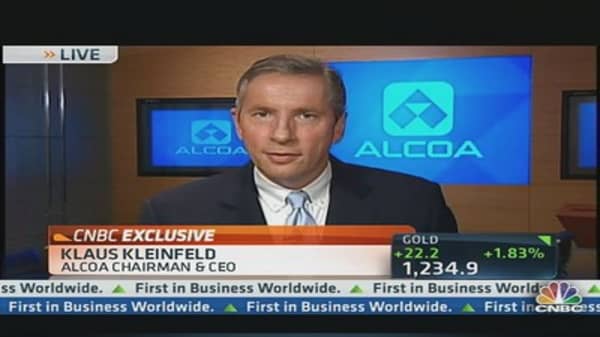Analysts had expected the aluminum maker to report earnings excluding items of 6 cents a share on $5.83 billion in revenue, according to a consensus estimate from Thomson Reuters.
Alcoa reported productivity gains across all units, and strong performance from its engineered products and solutions business, which makes high-margin goods like aerospace fasteners, turbine blades and truck wheels.
The company said it had positive free cash flow of $228 million during the quarter.
"It was nice to see their free cash flow was positive in the quarter. That was probably the biggest positive in the quarter. Three of their last five quarters had negative free cash flow," said Jonathan Pavlik, a portfolio manager at Steward Capital. "In light of their recent downgrade, it was also nice to see them cut their debt."
The London three-month aluminum price fell nearly 7 percent during the quarter ended June 30 and has tumbled around 13 percent in 2013. Aluminum touched a nearly four-year low late last month of $1,758 a tonne.
Stubbornly low aluminum prices caused by a global surplus and concerns about lackluster demand have weighed on Alcoa's business of mining bauxite, refining it into alumina and then smelting alumina to produce aluminum. Alcoa and many of its rivals have responded with production cuts and shutdowns.
Alcoa is no longer the bellwether it once was, due to the plight of the aluminum industry and the price of the metal, but its quarterly results are still closely followed, as they mark the unofficial start of the earnings season in North America.
Alcoa has enjoyed a tenure of more than 50 years as a component of the Dow Jones Industrial Average, but it is now by far the smallest company in the index. Its stock price has fallen more than 10 percent over the last 12 months, while the Dow itself has risen roughly 18 percent, over the same period.
Kleinfeld said the automotive market is strong in North America, which has helped boost demand for aluminum.
"We see in the automotive side very exciting things going on," said Kleinfeld. "We see demand on auto sheet quadrupling in the next three years and then another, the next ten years, another two-and-a-half times growth."
Alcoa is often viewed as a bellwether for the materials sector, and some look to it for hints on the health of the broader economy.
—By CNBC with Reuters




